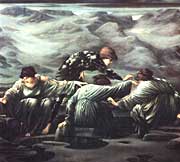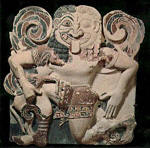Home List of Contents Links Contact Wood and Water The Labyrinth of the Heart
Face of Wisdom, Face of Dread. |
|
Perseus answered "I will do this gladly. But where can I find Medusa? And is there any aid you can give me?" Athene replied "You may borrow my shield. It is brightly polished, so bright that it could act as a mirror as well as a shield. So that you may travel swiftly I have borrowed for you the winged sandals of Hermes, who journeys on them not only in this world, but also to the realms of the gods and even to the Underworld. You must find out the path to Medusa for yourself. But you should enquire of the Graiae, who dwell far off in the midst of Ocean. They share between them the Eye of the Seer and the Tooth of True Speech." Perseus set out. He crossed many lands, met people whose ways appeared utterly strange to him and found that he appeared equally strange to them; he met beasts both beautiful and ugly, and saw that all behaved according to their nature. At last he reached the shores of Ocean, and prepared to travel above its waters till he found the island of the Graiae. As he
flew on he saw Ocean in all its changing moods. When the sun shone
he saw the blue and green depths, so calm that birds nested on its
surface and dolphins leapt from sea to air and fell back into the
sea. He gloried in the wildness of the Despite the winged sandals, his search took many days, and when at last he reached the island of the Graiae he was exhausted, unable to move further. He slumped down as he landed, and one of his sandals fell off into the sand. He searched for it, but was unable to find it and resolved to walk on although having only one sandal. He walked for some time, in his exhaustion doubling back and re-crossing his path many times before he found the Graiae. Those three strange women, who were old when they were born and had not aged in the many years since their birth, were passing between them the Eye and the Tooth. He asked them "Can you tell me how to find Medusa. The Goddess Athene has sent me, and she advised me to ask for your aid." One replied "We will not tell you." He thought angrily how easy it would be to seize the Eye and the Tooth and force them to answer. He considered doing this, since he could see no other way of getting the answer he needed. But he recalled also that Athene had told him to ask the Graiae, and had not in any way suggested he might have to use force. What would Athene want him to do? The long silence as he pondered what to do was broken when another of the Graiae said, "You may borrow the Eye. It will give you clear vision and you may see for yourself how to find Medusa", and the third said "You may borrow the Tooth, so that you can speak out the path." Perseus looked long through the Eye, and he appeared dazed when he gave it back, as if its vision had been beyond his imaginings. "Back," he said, "back along my path to where I started the journey." "But," he added as he returned the Tooth, "if that is where Medusa is, why did Athene send me so far?" One of the Graiae replied "Some have found the Gorgon without seeking us. But all of those have been turned to stone." Another said "Some have crossed the Ocean and tried to force the secret from us. Nothing more has been heard of them — doubtless they too have become stone." The third went on "But some, like you, have observed Ocean as they travelled, and rejoiced at its wildness and mystery. They have spoken to us courteously. Those have been successful in their task, as you may well be."
"But if others have succeeded before me," said Perseus, feeling confused, "how is it that Medusa is still there?" "How, indeed?" came the answer. "Perhaps Medusa, like the Hydra, grows a new head each time." "Perhaps" said another "there is a different Medusa for each seeker." "And perhaps" began the third, but she broke off when the other two glared at her as if she was giving away a secret. "Do you remember, young man," she went on "what Athene said to you. For you will not succeed in your task unless you bear her words in mind." Perseus, casting his memory back, said "Why, she lent me her shield and the sandals of Hermes and demanded that I slay the Gorgon and bring her its head." "Did she," came the answer "did she indeed? Well, young man, it is time for you to leave. Maybe, if you think hard, you will succeed. Perseus walked back to the place where he had landed. After some searching he found the missing sandal, bound it on, and began retracing his path. He kept trying to recall Athene's words and trying to work out a way to kill Medusa without seeing her face. He remembered that Athene had told him the shield was as bright as a mirror and wondered if it would be safe to see only Medusa's reflection. He uncovered the shield and looked into it. He saw reflected the calm sea, the blue sky, the sun and his own figure. He thought how handsome he looked, how brave, how loving and how loveable. A cloud
passed over the sun, the wind rose, and the waves began rising
fiercely as the shield misted over. When it cleared he saw himself
again with the angry elements reflected too. He saw how cruel he had
been many times, how mean, how He recalled how he had been about to threaten the Graiae to force answers from them. Force and threats had been his answer to so many problems. He saw in the shield the face of a woman he had once been attracted to. He was not her first choice, nor even her second, but he had driven his rivals away. One he had threatened with a beating if he did not leave. He had persuaded another man that she would be happier with a hero such as Perseus, and that his rival would give her up if he truly loved her. And once he had disposed of his rivals and won her, he soon tired of her, claiming that a hero had more important things to do than spend time with a woman. His sandals brushed the tops of the waves and he felt it would be best for everyone if he let himself fall into the water.
As he continued back along his path he saw that the seasons had changed. It had been spring when he started, but now leaves had fallen and winter was beginning. He returned to the place where Athene had first spoken to him and noticed a cave on the hillside, which he felt sure, was the Gorgon's home. He drew his sword, uncovered the shield and waited. A movement from the cave caught his eye, and involuntarily he glanced towards it. He caught a quick glimpse of Medusa's face, and his blood began to freeze. He stood still as a stone, feeling as if poisonous snakes were crawling all over him. He could think of nothing except how evil he was, unloving, cruel, fearful, not fit to be human, deserving only to be turned into stone as a warning to others. With a great effort he moved slightly and caught sight of Athene's shield, with his own figure reflected in it. He recalled that he had seen similar images of himself in the shield, but had been shown that, though they were true, they were only part of the truth. He felt free to move and lifted his sword once more to kill Medusa. But as he moved he reflected and remembered the parting words of the Graiae. What had Athene's exact words been?
NOTES Perseus is usually shown killing Medusa, and being given help by Athene and Hermes. He got information from the Graiae by stealing their single eye and tooth.
The name
Medusa means 'ruler', which seems an unlikely name for a monster. If
you have seen the Cretan plates and vases decorated with an octopus
(still made for tourists, sometimes based on ancient designs) you
might feel, as I do, that the octopus and its waving tentacles looks
very like a face with waving snake-like hair. Perhaps Medusa was
named 'ruler' because she was the Goddess of the Sea in the form of
an octopus — I was pleased to find Diana Paxson used the same
imagery in her fantasy novel The Sea Star. Home List of Contents Links Contact Wood and Water The Labyrinth of the Heart Images from
top:
|


 storms, when waves reached almost up to his feet and he saw the
great Sea-Serpent lashing its coils. At one time he heard the Sirens
singing and tried to go to them; fortunately his sandals refused to
obey him.
storms, when waves reached almost up to his feet and he saw the
great Sea-Serpent lashing its coils. At one time he heard the Sirens
singing and tried to go to them; fortunately his sandals refused to
obey him. 



